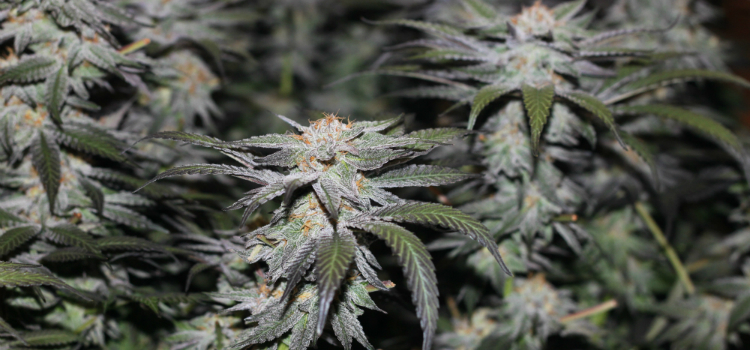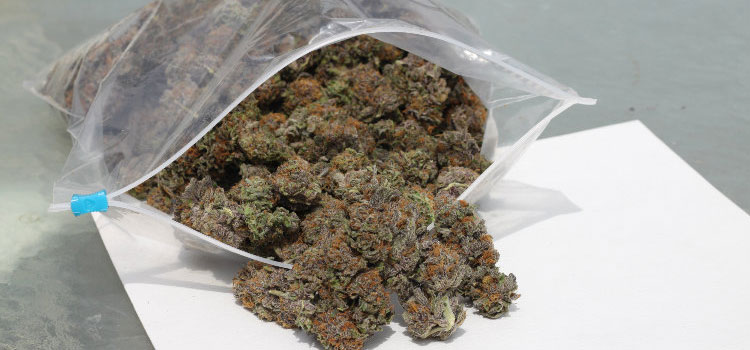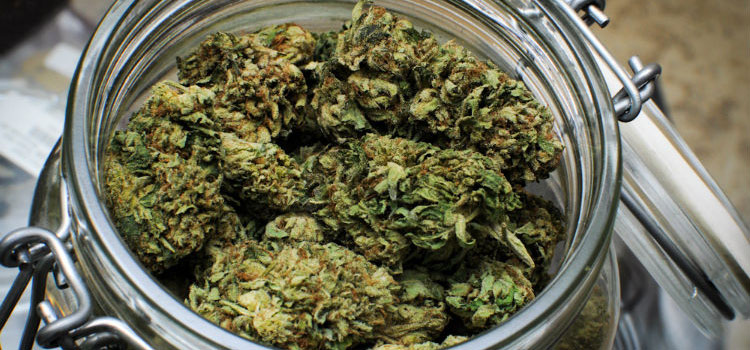 Eric Brandstad is the founder of Forever Flowering Greenhouses and a pioneer of light deprivation techniques for cannabis growers. Light deprivation essentially involves tricking a plant into thinking the days are shorter than they actually are, causing the plant to flower sooner than it would if it were exposed to the entire day’s duration of sunlight. This means that growers are able to work around the natural harvest cycle and get more crops out of the summer season.
Eric Brandstad is the founder of Forever Flowering Greenhouses and a pioneer of light deprivation techniques for cannabis growers. Light deprivation essentially involves tricking a plant into thinking the days are shorter than they actually are, causing the plant to flower sooner than it would if it were exposed to the entire day’s duration of sunlight. This means that growers are able to work around the natural harvest cycle and get more crops out of the summer season.
Eric recently joined our podcast host Shango Los to discuss his light deprivation methods, how the process has evolved over time, and how his company’s greenhouses are designed to make the process simple to manage on a commercial scale.
Listen to the episode using the media player below, or scroll down to read the full transcript!
Subscribe to the Ganjapreneur podcast on iTunes, Stitcher, SoundCloud or Google Play.
Listen to the podcast
Read the transcript
Shango Los: Hi there, and welcome to the Ganjapreneur.com Podcast. I’m your host Shango Los. The Ganjapreneur.com Podcast gives us an opportunity to speak directly to entrepreneurs, cannabis growers, product developers, and cannabis medicine researchers all focused on making the most of cannabis normalization. As your host I do my best to bring you original cannabis industry ideas that will ignite your own entrepreneurial spark and give you actionable information to improve your business strategy and improve your health and the health of cannabis patients everywhere.
Today my guest is Eric Brandstad. A fourth generation farmer, Eric is originally from San Joaquin County, California, where his family has been commercially farming since 1862. Eric has pioneered light deprivation with Forever Flowering Greenhouses since 2007 and is a much sought after speaker on the topic having spoken at the Emerald Cup, Santa Cruz Cup, Golden Tarp Awards, the CaliDepFest, Humboldt High Grade Gala, CannaCon, and at the NCIA Cultivation Management Symposium. Welcome Eric, glad you could be on the show.
Eric Brandstad: Thanks for having me.
Shango: Eric, let’s start at the beginning. Light deprivation is not familiar to everybody. What is it that light deprivation is trying to emulate?
Eric: Basically it’s outdoor growing with the ability to have multiple harvests during that time, particularly the summer. The old strategy, originally, formulated was to just black-box a cannabis plant. Back in 1992, when I first started hearing about this and learning about it up in the Humboldt County area, they were actually taking a box, like you’d get from a washing machine or a refrigerator, and individually covering each plant. Now what this did was trick the plant into thinking that it had shorter days, so essentially what you’re doing is cutting off the daylight hours back to 12 hours of light.
In the summertime we have this long summer day, and in order to get the plant to flower, we usually got to wait till the end of the summer basically, that Mother Nature naturally pulls back the hours on the clock and the plants begin to flower. Well, by black-boxing, or light deprivation, this makes the plant think it’s dark early, so it’s pretty simple in that regard, and the plants begin to flower. Now today in 2015, we have more sophisticated versions of light deprivation possibilities with the use of greenhouses, and now basically an industry has been formed.
Shango: I would think that with all the normalization sweeping the country that you’re getting a lot of contact from folks. Because you can do light deprivation on the cheap, but now people are like, “Wow, we can do growing that uses sunshine, so we’re saving electricity and our terpene profiles will be better, but we could also have multiple crops during the same year.” I mean people must go bananas when they first learn about this idea.
Eric: Back when I first started explaining this idea as a company or a business for myself in 2007, it was just like, “Oh, interesting,” and maybe a high five here and there, “Great idea,” but now it’s really sought after as an alternative or a solution to a business plan. Most business plans right now consist of indoor and maybe some outdoor, whereas now it’s really starting out with possibly the greenhouses and the indoor and the outdoor as the secondary measures.
Shango: For our listeners who have big, commercial grows, let’s give them something to envision. Can you describe what a greenhouse that has been tricked out for light dep will actually look like?
Eric: The greenhouses can look like a commercial greenhouse that would be an A-frame. It basically has the shape of an A, so when you’re looking at it from the outside, it’s got the pitched roof, almost like a metal building so to speak, but it’s a greenhouse. You can have these things gutter-connected which means they’re adjoined side-by-side. Sometimes they call them conjoined greenhouses because they’re literally attached by the gutter. When you start to do that, you can’t just have one big greenhouse in the sense that you have just one roof. When we go into gutter-connected structures, we might have one growing space underneath, say, four or five, six peaks. Also within those gutter-connected ranges, in those five, six, seven peaks, or whatever it is, can also be divided into separate light zones. They could be shared in one big space or divided up however the grower wants to do it. There’s a lot of options in the big gutter-connected commercial style greenhouses.
Here in Grass Valley, California, we have a 24×60 demo greenhouse that people fly in from all over the US to come see. They’ll fly into Sacramento, rent a car, drive up and see the smaller 24×60 demo greenhouse and get a pretty good idea of what’s going on. It isn’t the gutter-connected commercial version because we haven’t erected one of those on our site yet and that’s next, but we have a lot of pictures, emails. Like I said, coming to see us is really a great way to understand a lot of this.
Shango: Outside of the structure of the outside, can you describe the automated light dep technology itself? I was watching the great YouTube videos on your site. It’s like this big black cloth that goes across it. Can you break that out for us?
Eric: Basically in some of the YouTube videos, we have a retractable greenhouse that has a roof that opens and the sidewalls are independent. Then we have our Northern Latitude, which is the gothic-shaped frame. It has the breathable blackout fabric that goes throughout the whole greenhouse at every 12 foot section. It is a triple layer, breathable, blackout curtain and so it helps wick the moisture, because humidity can be increased as the curtains are closed. It’s a rack and pinion system in the Northern Latitude, so it’s all functioned by one motor. We can do up to a 30×144 in the Northern Latitude with one motor blacking out the whole greenhouse. Then when we get into the gutter-connected structures, we can have multiple motors in the multiple zones. It’s actually a simple system when it gets up and running. There’s a lot of components and brackets and hardware to hang it, but in the terms of how it operates, it’s a pretty cool, simple system.
Shango: I would think that a lot of challenges that you’d get from the early technique that you described by using an appliance box, that sounds like it’s cutting off air and all sorts of things. It sounds like when you develop the technology specifically for this purpose, and you’re using the right kind of fiber linen coverings, and you can really choose your materials, that you probably get rid of a lot of the downsides that were experienced with early days of light dep.
Eric: That’s an excellent point. I mean it was not a popular thing back in the day. It was like when organic first got popular, and it was looked at with the apple and you had a worm sticking out of it. Organic wasn’t the premier product that it is today. So light dep was the same thing. Light dep was like, oh, this early, not so happy looking material that wasn’t cared for very properly because the methodologies weren’t developed yet. We have a great deal of understanding now compared to what we knew then and what we even knew when we started the company. Now we are able to tell people why the things work, the way they work, and what the best policy is.
We used to have a catalog at one time when I started that was inclusive of a lot of things that were related to the greenhouse and horticultural industry, but they weren’t really related or specifically to cannabis, or we didn’t know that at the time. We actually eliminated a lot of things in order to guide people in the right direction. Instead of people calling and me saying, “What do you want?” I actually tell people what they need. It’s not because I’m trying to force feed them something that’s marginally-based. It’s really based off education and cannabis growing so that people can be successful.
Shango: I would think that your job as a salesperson during the sales cycle is actually more education than anything. Because once people are educated, the sale is pretty much already made. Hey, we need to take a short break. We’ll be right back. You’re listening to the Ganjapreneur.com Podcast.
Shango: Welcome back. You are listening to the Ganjapreneur.com Podcast. I am your host Shango Los. Our guest this week is Eric Brandstad of Forever Flowering Greenhouses and Light Deprivation. Before the break we were talking about how the constant evolution of these technologies is making the experience of the grower better and better. Let’s talk about some of those improvements. We were talking about in the old days they would use a cardboard box around a plant, which is obviously going to have ventilation issues, and a greenhouse is essentially another box. Now you’re going to enwrap it in this black fiber. What are you doing to be able to keep the air circulating because I’m thinking that it would get really humid really fast in there?
Eric: Oh, yeah, you’re right. Think about it, greenhouses were invented for the wintertime. Now we have people trying to use them in the middle of the summer and grow where they usually have maybe 300 days of sunshine or something like that. I mean it’s really against the grain, and when you think about it, it sounds like a hostile environment. Years ago it was, don’t get me wrong. It hasn’t been perfect the whole time. To understand all this stuff has taken a great deal of research and development, and it wasn’t all done by us. It was done by growers with feedback towards us so that we could understand what was happening. The evolution was really coming on strong in the last couple of years. That’s why I’ve taken on some of the public speaking, and been able to do things like this podcast and explain things in better detail than I would have a couple years ago even. This is definitely ongoing research, and we’ve come to a great place to be able to educate people so that they can be successful.
Shango: Does using sunshine in the winter demand supplemental lighting to be installed in the greenhouse to add to the short days?
Eric: Yeah, it does. I mean if you don’t have 12 hours of good sunshine, then supplemental lighting can definitely be a help. You can have plants that just need a little bit of encouragement, so supplemental lighting can be not so much on the production side as many people think. You’ve got to have a lot of lights, high intensity as well, for light deprivation. I have a lot of people that I know in areas of Santa Cruz and in other places in California that use simple little florescent fixtures just to keep the plants in check, because they do get enough sunshine that their plants do very well just off the sunshine alone. So the supplemental lighting varies from place to place. We do have people that are moving into other states that have up to 159 days of good sunshine, so the supplemental lighting will definitely be a higher intensity and closer spacing for these type of places.
Shango: What kind of technologies are you developing to help the greenhouse breath? We talked a little bit about the humidity early, so I’m sure that you’ve got some sort of creations to move the air around as well. What can you do to keep the circulation moving and keep the fresh air coming in when it’s wrapped?
Eric: My whole thing is first of all greenhouses that are used in the summertime, since they are against the grain, we need to know how to outfit the greenhouse first of all before we even do the light dep. If we figure out how to support the greenhouse properly, then we’re going to be able to have the plants perform better. Then when we apply the light deprivation technique, the plants won’t go through the hostile takeover that normally you’ve seen in other applications. What I’m getting at is basically a lot of people originally thought that clear glass was the best choice for a greenhouse cover. It let in more light, and the more light, the better growth.
What happens with cannabis plants is they really tend to sweat it out when they get warm, and that’s leaf surface temperature. We’re not talking about air temperatures. If you look back at an outdoor plant in the afternoon, it takes on a lot of sun. In order for it to cool itself, it actually transpires. It’s almost like a person. We perspire. Plants transpire, so when a plant warms up, it’s got to sweat it out basically. We don’t really see this on an outdoor plant other than the times that it gets a little bit droopy because it takes on so much water weight. As the surface temps decrease, the plants become perky again.
Now when we get into a greenhouse and we throw a roof over its head, and we find the humidity and the droplets forming on the greenhouse roof and dripping back down, it’s usually an indication of high plant transpiration. In order to mitigate that, a lot of times we’d look at ventilation. Primarily most people looked at mechanical ventilation, and mechanical ventilation means that we’re using exhaust fans and intake shutters basically. That might help keep relative same temperatures inside and outside because we’re doing one air exchange per minute but that doesn’t alleviate the humidity gain inside the greenhouse, which is also called the vapor pressure deficit.
When we have those things going on, a clear material in a sealed greenhouse with mechanical ventilation, typically what we see is a hot, hostile environment on the leaf surface because the plants typically are taking on too much sun, and they’re having to sweat it out. What we’ve figured out in order to fix this or to help it is not to use shade cloth, because shade cloth has been helpful for cannabis growers in these types of situations because it diffuses light and it scatters infrared. But what we’ve found is that there’s greenhouse covers that are a diffused cover, and a diffused cover transmits 85% light and diffuses it by 100%. What we’re doing is we’re actually scattering infrared, we’re blocking out UV, and we’re taking light particles and breaking them in half. So we get some of the same benefits of a shade cloth, but at the same time we’re creating more light particles within the greenhouse space. That right there, is kind of a game changer in some regards, to say that you’re taking away the sun’s intensity but creating more light optics at the same time.
The other part of that is that the mechanical ventilation doesn’t necessarily help as great as we’d like it to with the diffused cover. What I’ve found the cannabis likes best is to mimic outdoor conditions. The way to do that is through passive ventilation. Passive ventilation means the use of ridge vents and side vents and maybe a combination of a little bit of exhaust but primarily circulation vents on the inside of the greenhouse. What this does is it helps lower the leaf surface temperature of the plant. I’ve seen 100 degree air temperature days where it’s 100 degrees inside the greenhouse, 100 degrees outside, so we’ve avoided the solar gain, the greenhouse effect. We don’t want that in the summertime anyway.
Once we do that, we take my infrared thermometer and check the leaf surface of the plants, we find them to be in the high 80s and low 90s, which is pretty darn okay. Then when you do some other things that are discouraging heat, encouraging materials like the ground cover. Typically people put a black weed block down, and most of the grow bags and containers are black as well. Well, those two combinations with that color encourage a high amount of surface temps which adds to the temperature in the greenhouse, the temperature of the root zones of the plants. When we turn to tan grow bags, and I have a white ground cover that we put down, we actually discourage a lot of the heat-gaining things that are going on normally in a greenhouse, and it becomes a really supportive environment for the plants. We can see all this stuff by using the infrared thermometer and just shooting all the surfaces of everything.
There’s encouraging colors and discouraging colors. In the summer time, I call it summer mode, we do the things that discourage and promote passive ventilation. In the wintertime, we can seal up the greenhouse and even use colors that encourage free heat. That’s the main strategy. What happens when you pull your light dep cover is we don’t see the humidity spike like we normally did because the transpiration rates in the plants are in check. Normally at 5:30 to 7:00 in the afternoon, plants can be sweating it out at their highest point. When we pull our light dep plastics or covers or our black-box from the old days, we see the plants sweating it out, and it really doesn’t do them justice. They take on abolic stress, which means they can take on pests and disease at that point. They’re like an open wound.
By supporting the plants and covering them with a blackout material that’s a breathable material, we have the transfer of some of that humidity going through. Then we also have in our greenhouses the breathable walls, which allow us to actually turn on the exhaust system, which we couldn’t even do two years ago. With all these fail safes in place and these methods, now it’s starting to be proven through the analytical companies that light dep greenhouse material is testing higher and better than some indoor and outdoor material.
Shango: That’s a really great explanation. I can imagine that without all the water weight from the transpiration in the afternoon when it would get really hot in there that the plants really look a lot happier too, which makes us all happier as growers. It looks like it’s time to take another short break. We’ll be right back. You are listening to the Ganjapreneur.com Podcast.
Shango: Welcome back. You listening to the Ganjapreneur.com Podcast. I’m your host, Shango Los. Our guest this week is Eric Brandstad of Forever Flowering Greenhouses and Light Deprivation. We were talking about how great these greenhouses are especially in locations that get a lot of sunshine year round. I used to live in Boulder, Colorado, and one of the things I loved about it is that they were getting 300 days of sunshine a year. I would think that this would be a really great location, and they also have snow. In my experience, greenhouses get really cold in the winter. What effects does the light deprivation technology have on heat retention inside of these greenhouses during the winter?
Eric: That’s a great question. The most vulnerable time for a greenhouse is at nighttime in the winter. Even in the wintertime when the sun’s out we have a little bit of the ability to have solar gains, so we can get the greenhouses to warm up. But the minute the sun goes down, that’s it. Heat is necessary even in places in California as well as Colorado. When you get into Colorado sometimes the heating systems need to be a little more sophisticated. When I look at heat for greenhouses, the primary source, or I mean the primary objective, let’s say, to heating the greenhouses, first of all heating the plants, and that would be from the root zone.
One way or another, there’s a lot of different ways to do that. Some are more efficient than others and maybe more practical than others, Just like I talked about in the earlier segment of cooling the surfaces and discouraging some of that heat gain to support the plant, now we’re actually trying to support the plant by reheating some of these areas, and primarily that’s the root zone. Take for instance, some places in California I’ve dealt with that have been 30 degrees outside when they have a root zone at 70 degrees, the air temperature in the greenhouse can be down to 55 degrees. So the plant temperature is really important.
There’s different versions of root zone heat whether it’s in the concrete under the gravel, in the beds. There’s different versions of it under benches, so if people are doing stationary or even rolling benches, there can be heat applied underneath the benches so that you can keep the root zone warm. That’s primary heat. Then secondary heat would be a unit heater or also what’s called an aerifier heater, so it’s a typical propane heater up above that blows out hot air. With Colorado and snow accumulations, it’s good to have a heat source for the plants and also a secondary heater for that air temperature to be brought up in order to help melt snow.
Shango: How about heat retention? You’re describing all this heat that’s going to be created, but I’m assuming that a lot of the heat are going through these walls. Are these greenhouses typically double-walled?
Eric: Well, they can be. That’s a good point. Basically there’s places that don’t get very warm in the summertime and stay pretty cold at nighttime and definitely have a colder winter. I do promote the twin wall for areas like that and the diffused twin wall still. When you get into areas that still have 300 days of sunshine that get fairly warm in the daytime especially in the summer, what happens with the twin walls is the air in between is what heats up, and so sometimes it’s harder to passively cool a twin wall greenhouse because the air in between is always warm. You can’t cool the air in between those two little walls.
The transmission on the twin wall is starting to get better, like as good a the single wall for the diffusion properties, but again, we also have the light deprivation curtain system that closes. When you close the curtain system, it’s light tight, so it helps with the air movement. Even though the triple-air, breathable, blackout fabric does help move a little bit of that heat and humidity, it mostly is wicking the moisture when places that are in higher humidity, but mainly it’s an insulation blanket in the wintertime. Again, we don’t need our curtains as much for light deprivation in the wintertime as we do lights. A lot of people are turning on their lights in conjunction with closing the blackout material to protect themselves from light pollution. It kind of goes hand-in-hand.
Now we have places that for compliancy reasons need to have a light pollution plan. What they don’t realize that for those application writers is that we already have that dealt with because most people in the cannabis industry are buying a light deprivation greenhouse. If we’re blocking out the sun, we can definitely block the lights out from the inside going out. This also is a smaller volume of air to heat up, and so we can actually have our primary heat down below in the blackout zone with the lights that can encourage heat as well. Then above that we have the secondary heater for helping to melt snow and avoid having an air drop when the blackout curtain opens.
Shango: Yeah, right on, right on. I follow this. I want to ask you about one other thing before we wrap up here. We’re almost out of time. You are in a unique position as an entrepreneur because you are both educating your customers, and you’re also evolving the technology yourself. I can imagine that you’ve gotten a lot of pushback from folks who didn’t want to hear you out, or they just had their doubts or were skeptical. A lot of our listeners are developing new technologies to bring to market to help evolve the industry as a whole. What advice would you give somebody who is going to bring a technology to market that has to change minds?
Eric: I would just say that I know years ago when we first started this a lot of people didn’t look at this as a real industry, and it was kind of a joke or “Go ahead, good luck,” type of thing. The other thing a lot of people have always said, and I’ve even heard this recently at some trade shows, is that a plant is a plant. In some cases that might be true if you look up the genes or follow the chemistry of plants or whatever, but in my opinion cannabis plants are really specific. That doesn’t mean that they’re difficult. It just means that there’s specific, and they don’t really operate like a lot of other plants that I’ve been around or I’m familiar with.
I would say to take some advice or some understanding from some real growers and some people that have been in the cannabis industry for a good amount of time, that might be five to ten years at least with a little bit of a objective background, maybe with some people that have been around some other areas as well, because Colorado isn’t the breeding ground or ground zero for cannabis and how cannabis plants grow. Neither is the Indoor Grow Guide. I can appreciate the Indoor Grow Guides, but they’re not something that you take under your arm when you go back outside or learn to grow in a greenhouse. A lot of the things that we read in these books and things are specific to certain areas or styles of growing, whether that’s indoor or outdoor, or Washington or Colorado for that matter.
Shango: Yeah, right on. Well, Eric, that’s all the time we have for today. Thanks so much for being on the show.
Eric: Oh, great. Thanks for having me. It’s been great.
Shango: You can find out more about Eric Brandstad of Forever Flowering Greenhouses and Light Deprivation on their website which is foreverflowering.net. You can also watch Eric’s entire presentation at the NCIA Cultivation Management Symposium on YouTube, and it includes all the slides. It’s really worth checking out. You can find more episodes of the Ganjapreneur Podcast in the podcast section of ganjapreneur.com. You can also find us the Cannabis Radio Network website and in the Apple iTunes store. On the ganjapreneur.com website you will find the latest cannabis news, product reviews and cannabis jobs updated daily along with transcriptions of this podcast. You can also download the ganjapreneur.com app in iTunes and Google Play. We are thrilled to announce that you can now find the show on the iHeartRadio Network app bringing Ganjapreneur to 60 million mobile devices. Thanks to Brasco for producing our show. I’m your host, Shango Los.



















 Eric Brandstad is the founder of
Eric Brandstad is the founder of 



